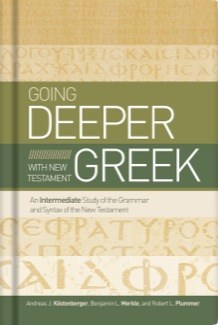Going Deeper with New Testament Greek: An Intermediate Study of the Grammar and Syntax of the New Testament (B&H Academic, 2016).
by Andreas Köstenberger, Benjamin Merkle and Robert Plummer
Genre: Biblical Reference / Language Study
Size: 550 pages.
What’s the big idea: The book aims to “stir in you a passion, and to provide you with the necessary tools, to ‘go deeper’ in your pursuit of your master of NT Greek” (p.1).
There’s a quip in New Testament Greek circles that, for every 9 Greek lecturers, there are 10 Greek grammars. The most recent contribution to the scene is Going Deeper with New Testament Greek: An Intermediate Study of the Grammar and Syntax of the New Testament (B&H Academic, 2016). I first heard about this volume through Rob Plummer’s Daily Dose of Greek videos, and thought it would be a good complement ahead of my second year of learning biblical Greek.
Easy to read? Surprisingly enough, yes. It’s certainly more readable than Daniel Wallace’s grammar (as excellent as it is). I think part of the charm of Deeper Greek is that it’s organised in a way that blends the traditional grammar with other helpful content (like a Swiss Army knife). Each chapter ends with practice exercises, a vocab list and tables summarising the content just covered. I came away enjoying, rather than enduring each chapter I read.
What I appreciated? Several things.
- I loved how every chapter features a short introduction where the author takes an example from the Bible to illustrate the practical relevance of the content to follow. For example, Chapter 2 on The Genitive Case begins with a translation issue in the Bible: should Luke 2:14 read “Peace on earth, good will towards men” (KJV) or “Peace on earth to those whom his favour rests” (NIV)? Lo and behold, it all hangs on whether there’s a genitive noun, and I’m hooked into going deeper into the rest of the chapter. Contrast this with Wallace, who writes assuming that you’re motivated to plow through 33 types of genitives without being convinced of its usefulness.
- I found the first chapter on the history of Greek and textual criticism very helpful to kick things off and bolster my confidence that in 99.9% of cases, we have in our Bibles God’s authoritative Word preserved for us.
- There’s a very interesting and informative chapter on verbal aspect, an area of debate among NT Greek scholars today.
- The last chapter gives practical tips to keep up your Greek. You really feel like the three authors are encouraging you to keep studying and mastering Greek.
- The book contains charts summarising each chapter. These are fantastic and would be worth the price of the book alone, though seems like you can purchase them separately.
What I would have liked to see:
- Section numbers. The lack of them throughout the textbook. It made it more difficult to find specific concepts more easily and to cite them.
- Less derivative content. Some chapters on noun cases seemed to lean on Wallace quite heavily, where it would have been nice to see the authors just present their own study of NT grammar and syntax
- An answer key for the Practice Exercises would have been helpful for students.
Who I’d recommend it to: Any Greek student with a year of Greek behind their belt, or a pastor who’s “apostasised” from their Greek in seminary and wants to get back on the saddle. If you’re a whizz at Greek and love getting into the details, the thoroughness of Wallace’s grammar might be more suitable.
Verdict: This book will help you to understand the language of the New Testament better, and to become excited about studying God’s Word more deeply.
More info:
- Deeper Greek website – coming soon, a website that will hopefully dive into some of the topics covered in this textbook. A video discussion on verbal aspect would be very helpful.
(I’m grateful to B&H Academic who provided a review copy of this textbook, which has not influenced my opinion of the book.)




